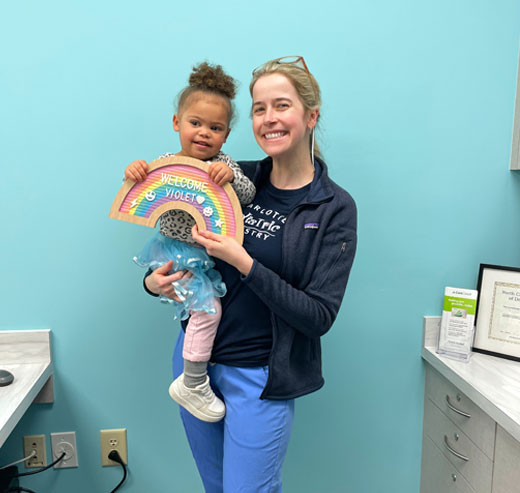As a new parent, you hear a lot of conflicting information about what you should or should not do. One common matter parents face is whether or not to give their baby a pacifier. Charlotte Pediatric Dentistry has put together a list of pacifier pros and cons, best practices for using them, and how to wean a child from a pacifier.
Benefits of Introducing a Pacifier to your Baby
If you’re wondering how a pacifier can be useful for your new baby, we’ve put together a list of pros:
- Soothing: Babies have a natural reflex to suck in order to soothe themselves. A pacifier can help soothe a fussy or upset baby.
- Sleeping: Pacifiers can help get a baby to calm down enough to fall asleep.
- Safety: Studies show that sucking on a pacifier can help reduce the risk of sudden infant death syndrome (SIDS).
- Disposable: Some children may start sucking on their thumb or fingers to soothe, but a pacifier can easily be thrown away in order to break the habit.
- Flying: Sucking on a pacifier during takeoff or landing on a flight can prevent ear discomfort in your baby due to air pressure changes.
Disadvantages of Babies Using Pacifiers
There are a few drawbacks and possible issues with letting your baby use a pacifier, including:
- Feeding: If introduced too early, a breastfeeding baby may have trouble latching and feeding because of a pacifier.
- Sleeping: When used to help your baby sleep, sleep may be interrupted each time the pacifier falls out of their mouth during the night.
- Dependency: Your baby may become reliant on their pacifier - and you may too. Parents can become quick to use the pacifier to comfort their baby, and the child does not learn how to comfort themselves on their own.
- Ear Infections: Babies older than six months using pacifiers have a higher chance of getting middle ear infections.
- Dental Issues: Prolonged use of pacifiers can affect how teeth come in and are aligned.
Best Practices for Pacifiers
If you do choose to give your baby a pacifier, we recommend following these tips for the best results:
- Instead of giving your a pacifier at the first sign of fussiness, trying rocking, feeding or soothing them other ways.
- If the baby is breastfed, the American Academy of Pediatrics recommends waiting until the baby is 3 to 4 weeks old before introducing a pacifier.
- Don’t force the pacifier. If your baby is uninterested in sucking on the pacifier and consistently spits it out, don’t keep putting it back in.
- Keep the pacifier clean. Before the baby is 6 months, it’s recommended to boil or sanitize pacifiers between uses. After 6 months, your baby’s immune system has matured more and cleaning a pacifier with soap and water is sufficient
- Watch out for wear and replace pacifiers when they begin to smell or look run-down.
- Only use pacifier clips that are a safe length. Too long, and the strap could get wrapped around your baby’s neck.
How to Break your Baby up with their Pacifier
It’s recommended that children stop using the pacifier by age two, as prolonged use after this age can cause speech delays and interfere with teeth alignment. Children who use a pacifier into their toddler years mostly common develop crooked, crowded and protruding teeth or an anterior open bite, which is a gap between the front upper and lower teeth.
When the time comes to wean your child from using pacifiers, Charlotte Pediatric Dentistry has a few methods, including:
- Cold turkey. Throw all of the pacifiers out and simply inform your child that they can no longer have one. Some parents tell them they were thrown out, while some tell their children they were given to the “pacifier fairy” for other babies to use.
- Cut the tips off of the pacifier. This makes sucking on it uncomfortable and less satisfying for your child, causing them to become uninterested.
- Phase it out. Start setting limits on when and where the pacifier can be used. Slowly cut back on uses during the day time, and then at night, and then get rid of it altogether. Eventually your child will realize they don’t need it anymore.
For more tips or answers to any dental health questions, contact the team at Charlotte Pediatric Dentistry.








